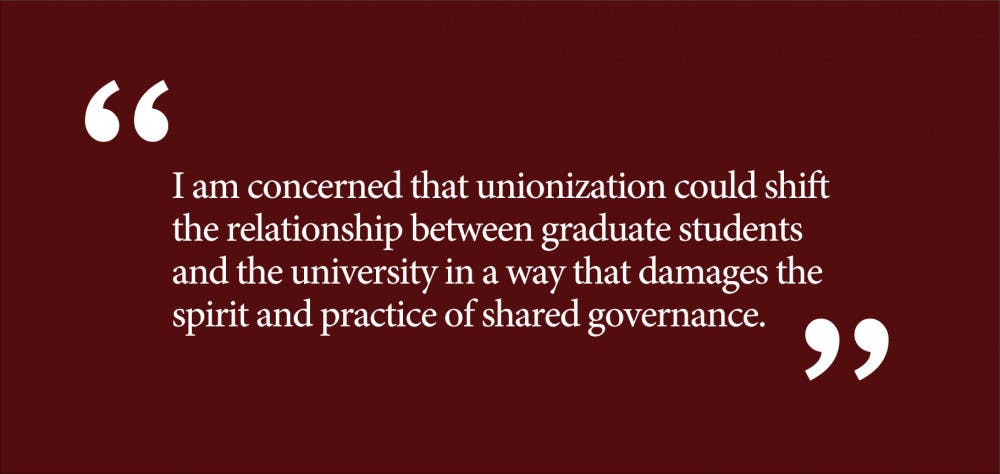In the coming days, graduate student teaching and research assistants at Brown will vote on whether or not to unionize. This is an incredibly important decision. The outcome of this election will shape the processes that determine compensation, benefits and working conditions for current and future graduate students and affect the relationship between graduate students and the University.
Though some of the rhetoric around unionization has been contentious, I see broad consensus on many points. We can all agree that graduate students are entitled to fair compensation and benefits, safe work environments and equitable treatment when concerns about working conditions are surfaced. We all want Brown to provide an inclusive and supportive environment where graduate students grow professionally and personally, work collaboratively with great colleagues and take pride and pleasure in their research and teaching.
The question is not what we want, but how best to achieve it.
Graduate students are currently being asked to weigh the pros and cons of unionization, factoring in possible gains in compensation and improvements in working conditions against the mandatory membership fees that come with unionization.
As graduate students make this choice, I encourage them to also consider the possible adverse consequences of unionization for Brown’s current system of shared governance, in which students, faculty and administrators work as partners to advance common goals.
Brown has a long and strong commitment to shared governance, more so than at any other university I have seen. This commitment is reflected in Brown’s mission statement, which describes the University as “a partnership of students and teachers in a unified community.” This ideal is reflected by the active and widespread participation of graduate students — who are both students and teachers — in the governance of Brown.
What does shared governance look like in practice? Currently, graduate students participate in at least 20 University committees that address everything from equity and diversity to the creation of new graduate student programs and campus sustainability. They serve on search committees for new senior administrators like provosts and deans. The president of the Graduate Student Council represents graduate student concerns on the Corporation Committee on Campus Life. In these formal roles — and at times through valuable activism — graduate students have championed diversity and inclusion, driven change in Brown’s Title IX policies and helped create childcare subsidies, among many other things. The University has long recognized and celebrated these contributions as fundamental to the fabric of a community committed to student-centered learning.
To give a concrete example: Graduate students are represented on the University Resources Committee, which makes recommendations each year on the University’s operating budget. In three of the past five years, the URC unanimously recommended percent increases in graduate student stipends that exceeded increases in the salary pools for faculty and staff, as well as improvements in health insurance and summer support. And these recommendations were approved. Through this process, the faculty, staff and undergraduate students on the URC demonstrated their appreciation for the important role that graduate students play at Brown, and became their champions.
I don’t claim that shared governance works perfectly. Sometimes it is slow and unwieldy. For example, over the past several years it became clear that Brown needed a better policy for handling graduate student grievances. These concerns eventually led to the formation of a Graduate School committee (with graduate student representation) that worked over the summer to produce a new policy. The policy was vetted with relevant campus groups over the fall, and was approved by the faculty earlier this month. Though this process was slower than we would like, it yielded a great outcome. And it brought graduate students, faculty and administrators together to advance the wellbeing of graduate students.
If Brown graduate students decide to unionize, I am committed to continuing on our current path of building superb graduate programs at Brown. We can’t be a great university without great graduate programs. And we will continue to practice shared governance where we can, in areas that don’t fall under the purview of the union.
I am concerned, though, that unionization could shift the relationship between graduate students and the University in a way that damages the spirit and practice of shared governance and, ultimately, weakens the quality of the Brown experience for graduate students. I fear that, as we become categorized into workers and management who stand on opposing sides of a bargaining table, we will erode the unified partnership of students and teachers who work collectively to support graduate students and advance graduate education. This would be a loss for the entire Brown community.
President Christina Paxson P’19 can be reached at christina_paxson@brown.edu. Please send responses to this op-ed to letters@browndailyherald.com and op-eds to opinions@browndailyherald.com.





